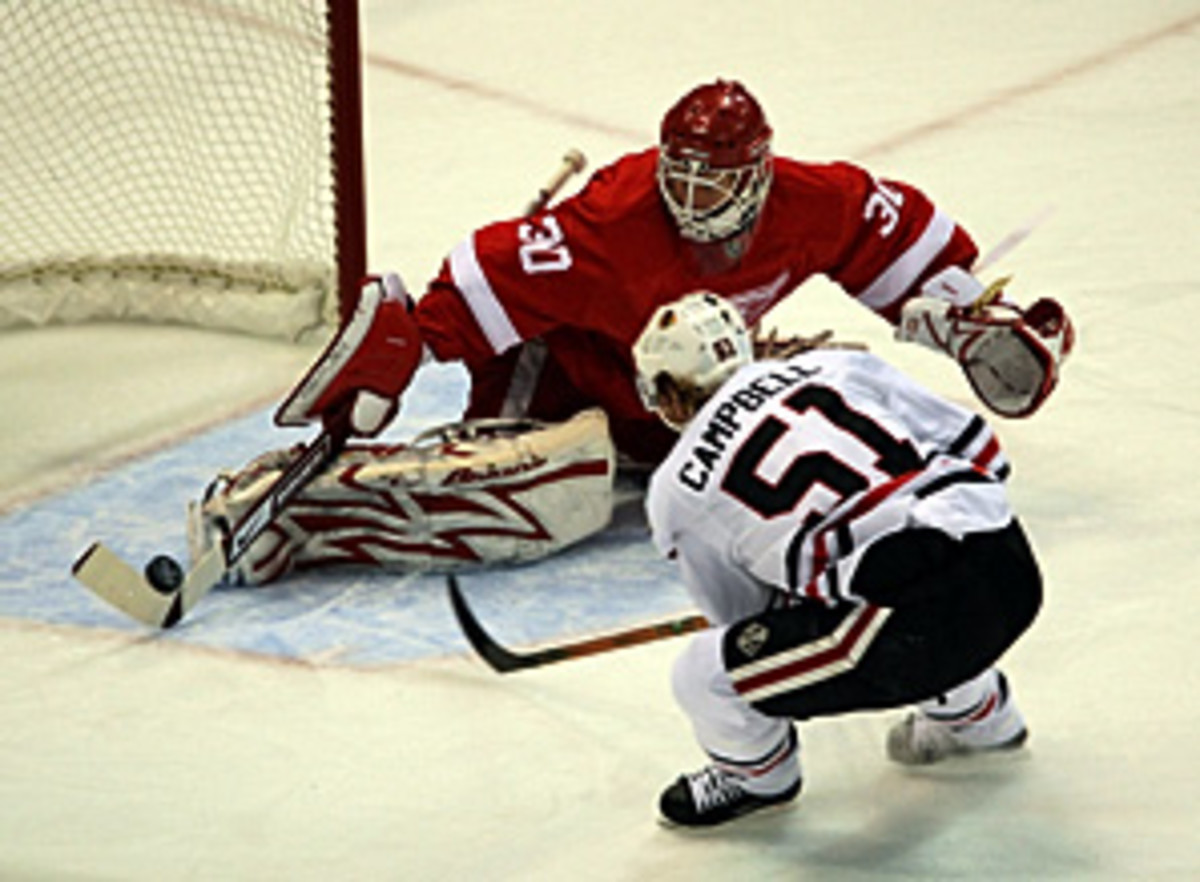
High-priced goalies guarantee little
One of the givens of playoff success is that it hinges upon having a proven and thus pricey commodity between the pipes. This year's conference finals seem to bear that out. Three of the starting goaltenders have won Stanley Cups in that role -- Detroit's Chris Osgood (three), Carolina's Cam Ward (one) and Chicago's Nik Khabibulin (one) -- and the fourth, Pittsburgh's Marc-Andre Fleury,played in last year's final.
But I say seem to because I believe that in today's game, a singular star in goal cannot make enough of a difference to win a team the Cup. Even if you buy into that premise, doling out an inordinate amount to that one player/position still doesn't make the sense it may have pre-salary cap.
In a sort of unofficial ranking based upon remuneration, Osgood is well below those other three starters. In fact, Detroit's combined outlay for its veteran tandem of Osgood and Ty Conklin in 2008-09 was $2,450,000. The Blackhawks, by contrast, shelled out over $12 million for Khabibulin and free-agent acquisition Cristobal Huet.
Both teams are now in the same place, except that the Wings lead the Hawks in the WCF, are favored to win it, and Osgood gives Detroit the edge -- certainly in the return on its investment. For Khabibulin ($6.75 million), this is his first-postseason appearance since winning the Cup with Tampa Bay in 2004. His tenure in Chicago has been spotty at best, with him not displaying his old form until late this season and on into the postseason.
Look further at the playoffs so far. The Washington Capitals with unproven rookie Simeon Varlamov ($850,000)prevailed over the New York Rangers and Henrik Lundqvist with his $7.75 million price tag. The Anaheim Ducks behind 27-year-old Swiss sophomore Jonas Hiller ($1.3 million) upended the Presidents' Trophy-winning San Jose Sharks and veteran goaltender Evgeni Nabokov with his handsome salary of $5.5 million. Other first-round casualties included Marty Brodeur at $5.2 million and Miikka Kiprusoff's whopping $8.5 million.
Then we had the second round where Vancouver led Chicago in all six games and blew two separate one-goal advantages in the third period alone of a wild series-ending loss. Even the Canucks' captain and highest-profile player, goaltender Roberto Luongo with his $7 million salary, couldn't make all those leads stand up.
Don't get me wrong. This isn't some sour grapes piece by a former goalie begrudging the netminders of today what they're able to garner in wages. Good for them. No, this is about a potential shift in priorities in a cap era where it is harder for goalies to dominate or differentiate themselves because of the style of play.
Since the league returned to the ice in 2005-06, the emphasis has thankfully been on skating and skill and scoring. And there are now more variables associated with winning, including the role of mobile defensemen who can help a team by both skating to defend and moving up on the play to aid and abet the attack. A goaltender, no matter how skilled or accomplished, is but one factor in that equation.
In Ward's case, he hasn't been in the playoffs since the Hurricanes hoisted the Cup in 2006 -- a run that he began as their backup before taking over in Game 3 of the first round and winning the Conn Smythe Trophy. Silverware aside, he's still a guy who missed the playoffs the past two years -- yet he's also a goalie who has never lost a playoff series at the NHL level and is 4-0 in Game 7 showdowns, including the Cup-clinching game in 2006 and both series victories this year. His price tag: a reasonable $2.5 million.
Then you have Osgood. All he does is win. He backed up Mike Vernon when the Wings won in 1997. He backstopped their repeat in '98 and came off the bench last year to replace Dominik Hasek and lead them to their fourth title in 11 years. Despite that resume and the fact that he ranks 10th all-time in wins, people always question Detroit's goaltending. I've never understood that when you look at Osgood's body of work -- numbers that should put him above reproach no matter what the numbers on his paycheck may indicate.
Of course goaltending remains an important element to a team's success. Someone who is dependable and mentally tough enough to roll with the flow and has the ability to make timely saves will never go out of demand. But the realities of the salary cap, especially with the likelihood of it going lower in years ahead as the economy sputters, should give teams cause to take a good hard look at their bottom line in net. Adjusting the pay scale for puckstoppers downward makes good sense as teams look to reprioritize the tighter resources they'll have to allocate across their rosters.
Spending wisely is working in Detroit.





